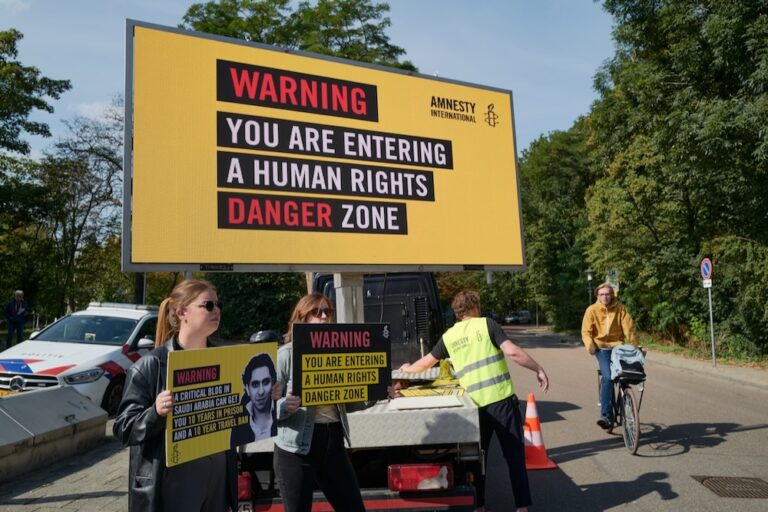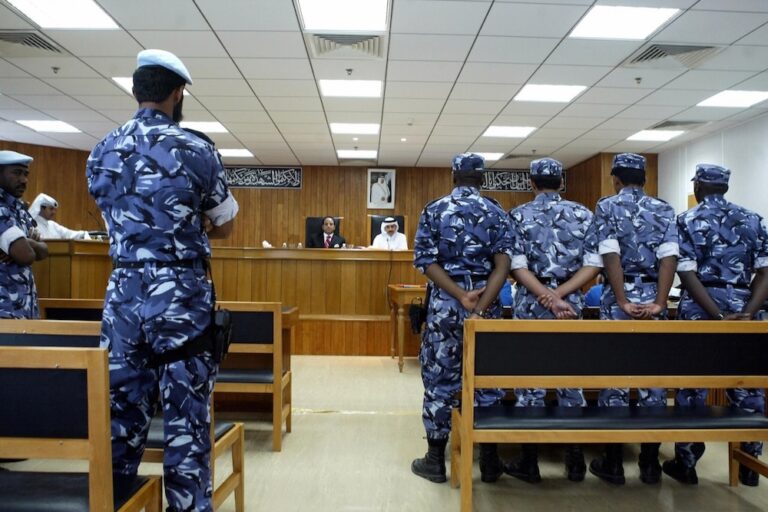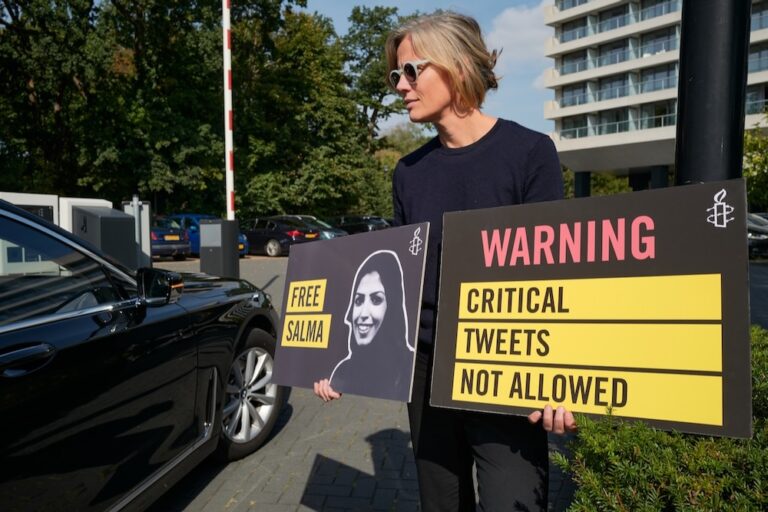Authorities are undertaking a fierce campaign to crackdown on rights defenders to prevent them from monitoring and reporting on ongoing violations, particularly relating to freedoms of expression and assembly and prisoners' rights, demands for reform, or the defense of fundamental rights and freedoms in the Kingdom.
(CIHRS/IFEX) – 2 July 2012 – “The government of the Kingdom of Saudi Arabia has succeeded at placing itself as a direct enemy to human rights, whether by continuing to stifle the rights and freedoms of its own people; or by vigorously supporting oppressive governments in desperate attempts to prevent the substantial transformations in the balance of power unfolding across the Arab region from reaching the Kingdom,” said CIHRS today in a statement.
In attempts to fully immunize itself from the wave of pro-democracy protests and uprisings sweeping the Arab region since the beginning of 2011, Saudi Arabia adopted severely oppressive practices against almost all domestic democratic initiatives calling for the realization of fundamental rights and freedoms.
CIHRS has noticed a particular rise in violations targeting human rights defenders and rights organizations in the Kingdom. While civil society in Saudi Arabia traditionally faces severe restrictions, authorities are undertaking a fierce campaign to crackdown on rights defenders to prevent them from monitoring and reporting on ongoing violations, particularly relating to freedoms of expression and assembly and prisoners’ rights, demands for reform, or the defense of fundamental rights and freedoms in the Kingdom.
Significantly, rights activists in Saudi Arabia work under highly repressive conditions, as they often face threats and intimidations, arrest, detention, interrogation, in addition to arbitrary travel bans, and trials before exceptional courts which do not meet basic standards for a fair trial. Charges normally brought against activists include “distorting the reputation of the country,” “affiliation with suspicious groups,” “establishing organizations without authorization,” “stirring up civil strife and inciting public opinion against the governing institutions,” “calling for demonstrations” or, most recently, “provoking international organizations to adopt stances against the Kingdom.” These violations are amplified with the existence of an unjust judicial system, often defined by its allegiances to the executive.
Most recently, in June 18, Dr. Mohammad Fahad al-Qahtani, one of the most prominent rights advocates in Saudi Arabia and co-founder of the Saudi Civil and Political Rights Association (ACPRA), was presented with 11 politically motivated charges related to his human rights and advocacy work as he was brought before a court in Riyadh. Most notably, Dr. al-Qahtani faces the charge of communicating with the United Nations Human Rights Mechanisms. He stands accused of using ‘false’ facts and information “as evidence to official international apparatuses (the mechanisms of the Human Rights Council of the United Nations) by way of some statements which he presented to the aforementioned institutions.” Other charges include inciting the public against authorities, breaking allegiance to the ruler, turning international organizations against the Kingdom by transmitting false information on the status of human rights in the country, accusing the judiciary of allowing torture, and founding an unlicensed organization. If found guilty, Dr. al-Qahtani could serve up to 5 years in prison and face a heavy fine.
On 29 June 2012, CIHRS delivered an oral intervention before the 20th session of the UN Human Rights Council addressing the issue of reprisals against human rights defenders for working with the Council’s mechanisms. The intervention specifically condemned the charges brought against Dr. al-Qahtani for cooperating with UN human rights mechanisms. In its intervention, CIHRS expressed its uttermost concern over the targeting of activists for their cooperation with international human rights protection mechanisms and stated that “the UN Human Rights Council [must] continue to act on the issue of reprisals with the required determination (. . .) and take a firm stand to ensure that States, including members of the Council, do not hamper the ability of human rights defenders to cooperate with UN human rights mechanisms.”
Similarly, other members of ACPRA face persecution as well. Some are among the many human rights defenders who are currently serving prison sentences in the Kingdom. Mohamed Saleh al-Bjady, a member of ACPRA, was sentenced to 4 years of imprisonment, followed by a five-year travel ban, on 10 April 2012. He has been held in detention since 21 March 2011. Additionally, on 11 June 2012, Dr. Abdullah al-Hamid, another of ACPRA’s founders, was also presented with the list of charges against him during his trial; all of the charges directly relate to his exercise of basic rights and freedoms. The trials of both Mohammad al-Qahtani and Abdullah al-Hamid are due to resume on 1 September 2012. Moreover, Dr. Abdulkareem Yousef al-Khoder, another founder and current President of ACPRA, has been under investigation by the Public Prosecution since March 2012.
ACPRA was established in October 2009 and has been diligently documenting cases of human rights violations in Saudi Arabia, focusing particularly on the thousands of cases of arbitrary detentions in the Kingdom. ACPRA has contributed to numerous submissions to the UN Special Procedures, namely the Working Group on Arbitrary Detention.
Under Saudi laws, non-governmental human rights organizations are not allowed to operate as legal entities. Authorities have refused or ignored several requests to register human rights organizations in the past. As a recent example, in December 2011, authorities refused to register Adala Center for Human Rights. Additionally, the majority of websites belonging to human rights groups continue to be blocked inside the Kingdom, including the website of Human Rights First Society (which authorities also refused to register) and of the Committee for the Defense of Human Rights in the Arab Peninsula.
This is in addition to a long list of trials currently taking place against other activists in the Kingdom like Mekhlef al-Shemari, who faces charges like “defaming the reputation of the kingdom in international media outlets”, “communication with suspicious organizations”, and “accusing government institutions of corruption”; and activist Waleed Abul Kheir who is undergoing trial for “defaming the judiciary”, and “harming the reputation of the kingdom through giving out false information to international organizations.” Additionally, activist Raef Badawi, remains in detention since his arrest on June 17 on charges of creating a liberal network and mistreatment of his parents.
This way of confronting human rights work clearly aims to silence those who attempt to shed light on human rights violations committed by the Saudi authorities. These methods are seen as a war against human rights organizations and activists, as the authorities essentially seek to criminalize all work in the field of human rights.
CIHRS calls on the authorities in the Kingdom of Saudi Arabia to lift all restrictions to which rights work is currently subjected to in the Kingdom, including travel bans and restrictions on forming human rights associations. All forms of harassment and intimidation of human rights defenders must cease, along with the trials to which rights defenders are subjected. Imprisoned activists must be released and human rights defenders allowed to carry out their work of exposing rights violations.


